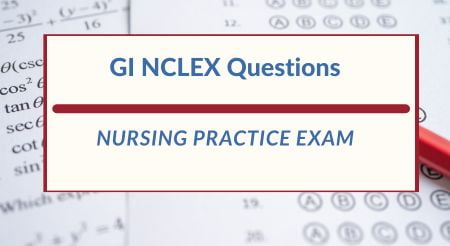Last updated on January 28th, 2024 at 09:24 am
Welcome to our GI NCLEX Questions test bank. Below see questions for the Gastrointestinal NCLEX Questions.
These GI practice tests offer invaluable practice tests specifically designed to prepare student nurses for the National Council Licensure Examination (NCLEX).
GI NCLEX Questions
GI NCLEX Questions #1 (25 Questions)
GI NCLEX Questions #2 (25 Questions)
GI NCLEX Questions #3 (25 Questions)
NCLEX Review GI Disorders
Gastroesophageal Reflux Disease (GERD): GERD is a chronic condition where stomach acid frequently flows back into the esophagus, causing symptoms like heartburn, regurgitation, and chest pain. Lifestyle modifications and medications like proton pump inhibitors (PPIs) are common treatments.
Peptic Ulcer Disease (PUD): PUD is characterized by open sores that form on the lining of the stomach, small intestine, or esophagus due to the erosion from stomach acid. Helicobacter pylori infection and NSAID use are common causes. Treatment involves antibiotics, acid-suppressing drugs, and lifestyle changes.
Inflammatory Bowel Disease (IBD): IBD includes conditions like Crohn’s disease and ulcerative colitis, which are chronic inflammatory disorders of the gastrointestinal tract. Symptoms may include abdominal pain, diarrhea, weight loss, and fatigue. Treatment aims to control inflammation and manage symptoms with medications and, in severe cases, surgery.
Irritable Bowel Syndrome (IBS): IBS is a functional gastrointestinal disorder characterized by abdominal pain, bloating, and altered bowel habits without any structural abnormalities. Management involves dietary changes, stress reduction, and medications to alleviate symptoms.
Appendicitis: Appendicitis is the inflammation of the appendix and is considered a surgical emergency. Symptoms typically include right lower quadrant abdominal pain, fever, nausea, and vomiting. Surgical removal of the appendix (appendectomy) is the standard treatment.
Cirrhosis: Cirrhosis is advanced scarring of the liver caused by various conditions, including chronic alcohol abuse, viral hepatitis, and fatty liver disease. Symptoms may include jaundice, ascites (abdominal fluid accumulation), and hepatic encephalopathy. Management involves addressing the underlying cause, lifestyle changes, and supportive measures.
Gastroenteritis is the inflammation of the stomach and intestines, often caused by viral or bacterial infections. Common symptoms include diarrhea, vomiting, abdominal cramps, and fever. Treatment focuses on fluid and electrolyte replacement to prevent dehydration.
Diverticulitis is the inflammation or infection of small pouches (diverticula) that can form in the walls of the colon. It may cause abdominal pain, fever, and changes in bowel habits. Mild cases can be managed with antibiotics and a clear liquid diet, while severe cases may require hospitalization and intravenous antibiotics.
Gallstones are solid particles that form in the gallbladder and can block the bile ducts, causing pain and inflammation (cholecystitis). Symptoms may include right upper quadrant abdominal pain, nausea, and vomiting. Treatment may involve pain management, dietary adjustments, and surgical removal of the gallbladder (cholecystectomy).
Hepatitis is the inflammation of the liver and can be caused by viral infections (hepatitis A, B, C, etc.) or non-infectious factors (alcohol, drugs). Symptoms may include jaundice, fatigue, and abdominal pain. Treatment depends on the type and severity of hepatitis and may include antiviral medications, supportive care, and lifestyle changes.
Celiac disease is an autoimmune disorder triggered by the consumption of gluten, a protein found in wheat, barley, and rye. It damages the small intestine lining, leading to malabsorption of nutrients. Symptoms include diarrhea, weight loss, and abdominal bloating. Treatment involves a lifelong gluten-free diet.
GI Nursing Diagnosis and Care Plans
See our Gastrointestinal Disorders page or use the search box to find the disorder.



I am totally Agree with you
This is very informative
Thanks for posting this useful information.